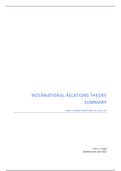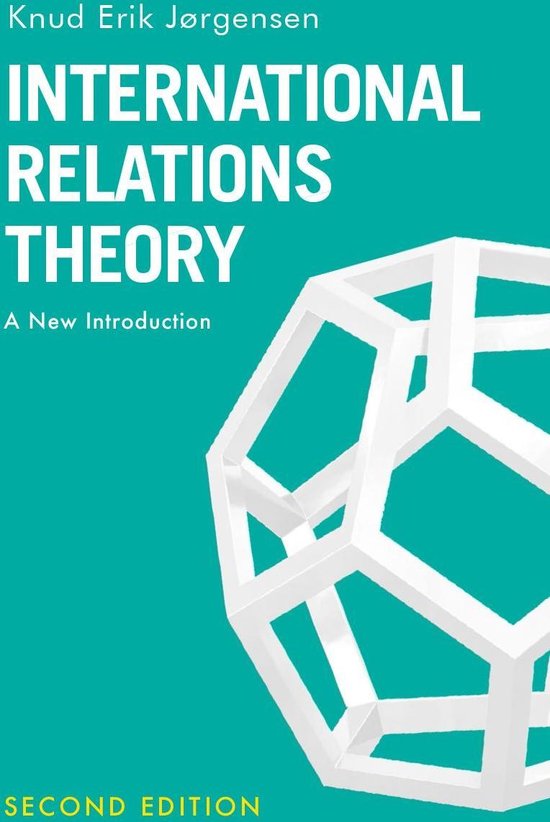INTERNATIONAL RELATIONS THEORY
SUMMARY
PART 1: (BOOK CHAPTERS (1,2,4,5,6,7,8)
Prof. D. Lesage
Academic year 2019-2020
, CH 1: INTRODUCTION
Theorizing à process to refine knowledge, producing a concentration of insights
- Theory is a prime shortcut to knowledge about international affairs
Theory can do 2 things
- It can very efficiently simplify the complex world
- It functions as a guide to the analysis of international actors, structures or processes
o To focus on what’s important
Aim of the book: introduce the main traditions, currents of thought and numerous specific theories
à the main layers of theoretical reflections on international relations
MAIN THEORETICAL TRADTIONS
à 7 main theoretical traditions
1. International Political Theory
2. Liberalism
3. Realism
4. The International Society Tradition
5. International Political Economy
6. The Post-Positivist Tradition
7. The Human-Nature Tradition
1. international political theory
à Analyze international affairs by means of concepts that belong to the field of political theory
- Rights, justice, obligations, norms, ethics, and community
They examine normative issues and interpret the writings of political philosophers (e.g. Kant,
Confucius, Hobbes, …) and discuss what they might have to say about contemporary international
affairs
They critically examine political reasoning à justifications or explanations of choices and political
action
2. liberalism
à Believe that change and progress is possible
- Human reason and rationality explain why human beings are capable of making progress
possible
Also believe that international politics should not be characterized by anarchy and war
- Anarchy can be molded by means of international institutions
, - Economic interdependence reduces the benefits of war and therefore its likelihood
- Democratic states tend to be more peaceful (towards each other)
o Increasing number of democracies à enlargement of global peace zones
3. realism
à Strong focus on the role of power politics and professional pessimism concerning international
progress
- Assume that history repeats itself endlessly à represent a circular conception of history
Strongly state-centric, focus primarily on conflicts and dismiss the importance of international
institutions and non-governmental actors
Peak: Cold War
- Strong position in US
4. the international society tradition (english school)
à Reject the simple opposition between Liberalism and Realism
- The inclusion of a third tradition allows to do more nuanced studies that more accurately
describe the complex world
Argue that key features of an international society (e.g. rules and institutions) exist and have important
consequences for the nature of international affairs
Highlight the sociological dimensions of international relations
5. international political economy (ipe)
à Object the separation of international economics and politics
- Theorize linkages between the two
Tradition that most directly includes economic dimensions of international relations
ßà Can be conceived of in various ways
- Simply the employment of economic approaches and research techniques in the study of
politics
- Marxist tradition: emphasizing the determining effects of economic factors on politics
- Extend the realism tradition by adding attention to economic factors
One of the truly global traditions
6. the post-positivist tradition (ppt)
à Aim at going beyond positivism and exploring the analytical potentials that emerge when positivism
is left behind
They go in 3 different directions
, - Critical Theory
o Quasi-Marxist, 1920s
- Social constructivism
o Set of commitments to social theory
- Poststructural approaches
Shadow of Western positivism à post-positivism mostly practiced in the West
7. human-nature tradition
à In addition to theorizing human nature as such, the tradition includes theoretical perspectives on
the interaction between human beings and nature (material environment)
E.g. old-time geopolitics, attacks on the life sciences into the field of international studies
UNDERSTANDING THE 21 S T CENTURY BY FOCUSING ON THE 20 TH
The genealogy of international relations theory goes way back
However, this book focuses on developments in the 20th century
- The contemporary discipline has been profoundly shaped during that century
- All 7 traditions have been shaped by 20th century world affairs, by the general dynamics of the
social and human sciences, by the growth of academia, by changing trends in the production
of knowledge
à Enables us to be more comprehensive and to explore more deeply and widely the world of
contemporary theoretical reflections and debates.
, CH 2: WHY THEORIZE INTERNATIONAL RELATIONS?
The author provides 5 major sets of reasons for engaging in theoretical reflection
1. A prime function of theory is guidance of research
o Engagement in interpretation is unavoidable and different lenses lead to different
interpretations
o Theory can be interpreted as such lenses
o Competent analysis requires knowledge of the potentials and limits of the different
options
2. Theory is an excellent tool to challenge prejudices, traditional world views or conventional
wisdom
o Theory produces intriguing questions to analyze and enables examination of implicit
assumptions and perspectives
3. Theory makes it easier, or at least possible, to grasp the modern world
o Theory conceptualizes the world, simplifies complexity and outlines feasible paths of
enquiry
4. Theory can play an important role when we want to evaluate political practice
o Politically convenient reasoning can be challenged by means of theory-informed
investigations
5. International Relations is a discipline that is defined by its theories
o Knowledge of its theories is thus a prerequisite
à It simply takes theoretical reflection to summarize and synthesize the findings of empirical studies
10 perspectives on the function of theory
1. Theory can be seen as a guide we need to conduct research to upgrade our studies from
description to analysis
2. Theory can help us interpret data and put it into perspective in order to focus on what is
important
o Theory points out how things hang together, what key terms mean and how valid
arguments are composed
3. Theory can help improve our analytical competences à theory serves to question or challenge
our existing world views
o Knowledge of contending perspectives simply leads us to recognize that our individual
image only constitutes a part of the full story
4. There is one world but different interpretations of it à the role of theory is to make us
conscious of perspectives that otherwise might be implicit or taken for granted
5. Theory is foremost a simplifying device
o Selection and prioritizing are prime functions of theory
, 6. Knowledge of contending theoretical perspectives is also simply a precondition for grasping
the modern world
o In order to grasp all the important aspects of the modern world, we need to draw on
the entire theoretical repertoire
7. All theories can be recognized by their 3 fundamental dimensions of theoretical reflection
o Ontological
§ Identifies ‘existing things’ (material/ideational)
o Epistemological
§ How we can know about these things
o Normative
§ What we should make of those things
8. Attempts to avoid theory not only miss interesting questions but rely implicitly on a framework
for analysis that remains unexamined precisely because it is implicit
9. International Relations (IR) is a discipline that has largely been defined by its theories
o Without understanding the theories, it is next to impossible to understand the
discipline
10. Many theories serve the dual function of providing both critique of foreign policy and
prescriptions or recommendations for a certain course of action
WHAT IS THEORY?
There are differing views about theory, some are narrow, some are broader.
- Widespread and narrow conception: implies an unfortunate reduction of the research and
teaching agenda
This book: favors relatively broad conception of theory
- The term ‘theory’ is not limited to its ‘scientific’ or positivist formulation
- There are many paths of theorizing
Chris Brown’s understanding of theory is helpful:
- He claims that there are essentially 3 categories of theory
o Explanatory theories
§ They attempt to explain why and under what circumstances wars happen
o Normative or prescriptive theories
§ Try to tell us what our attitude to war ought to be
o Theories which interpret events
§ They attempt to give meaning to them
à Each of these categories comprises numerous specific theories and is cultivated by theorists in all
of the major theoretical traditions
, Craig Parsons: explanatory arguments follow 4 major and differing paths
- Structural
- Institutional
- Ideational
- Psychological
Interpretive theory also comprises a broad range of more specific theories
Normative theory: students cannot avoid engaging in normative reasoning since they often have not
been introduced to international political theory
THEORETICAL TRADITIONS
Timothy Dunne: intellectual traditions share the following 4 attributes to varying degrees:
- Classification
o Provides a certain order of intellectual currents
- Continuity
o Demonstrates that patterns of thinking have evolved over time
- Abstraction
- Exclusion
o These both imply that we aim at understanding the larger picture of affairs
Notion of tradition à often a means to reduce complexity by means of simplifying and emphasizing
various heuristic functions
Luigi Bonanate
à ‘Intellectual tradition’: a corpus of centuries of research, characterized by classics, schools of
thought, original proposals and a specialized debate
Larry Laudan
à A research tradition is a set of general assumptions about the entities and processes in a domain of
study, and about the appropriate methods to be used for investigating the problems and constructing
the theories in that domain
- A research tradition is not explanatory, predictive or testable, yet provides the guidelines for
theory building
à The definitions of theoretical traditions may vary but are first and foremost variations around a
common theme
the 7 theoretical traditions included in the book
1. International political theory
2. International liberalism
3. Political realism
4. The international society tradition





